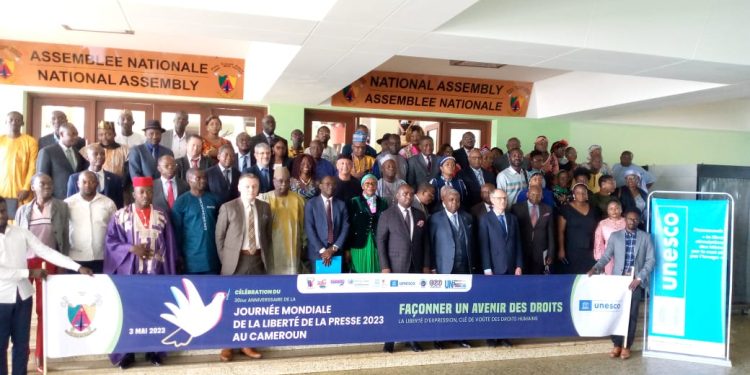Story, Louvier Kindo Tombe
In all the different events organised in line with the celebration of World Press Freedom Day 2023, the various media association and trade unions were unanimous on the advancements made, and challenges facing the press in Cameroon.
“Press freedom is a reality in our country but needs to be improved upon,” says Jude Viban, national president of CAMASEJ.
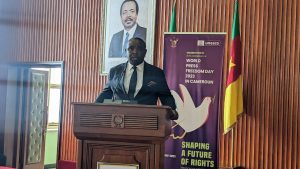
The president of CAMASEJ was speaking during one of the events organised by the ministry of communication and UNESCO in Yaounde.
“We can be proud of what we have done in terms of liberty of press in Cameroon,” Communication Minister, Rene Emmanuel Sadi said at the event.
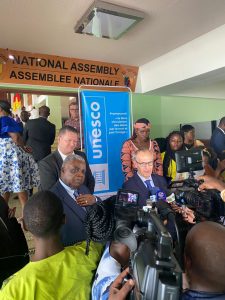
“… but of course, liberty does not mean anarchy, you have to use it with a sense of responsibility.”
By joining the celebration of World Press Freedom Day, UNESCO wants to contribute its own quota in the respect of human rights through freedom of expression.
According to UNESCO, “If everything is alright in the news, something must be wrong with journalism. Without press freedom, there are no HumanRights”.
Freedom of speech underpins the protection of all other rights. It is in that line, that the United Nations chosed as theme for the 30th edition of world press freedom day, “shaping a future of rights, freedom of expression as driver of all other human rights”.
The graph of journalism practice in Cameroon is not smooth, reasons why special attention this year was given to the various challenges faced by media practitioners.
Practicing journalism in Cameroon
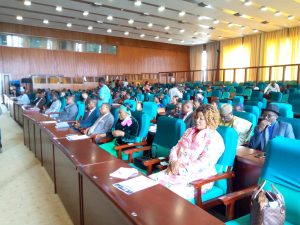
The journalism profession in Cameroon has been infiltrated by quacks, who most often are responsible for the various media offences.
“We are faced with the situation of fly by night journalists,” Jude Viban said.
The present legal instruments covering the profession in Cameroon have opened the floodgates for just anyone to be referred to as a journalist.
“We can still not tell with exactitude, who is a journalist in Cameroon,” Franklin Sone Bayen, senior investigative freelance journalist said during one of the WPFD activities dub “thinking time” organized in partnership with the United Nations Development Program in Cameroon.
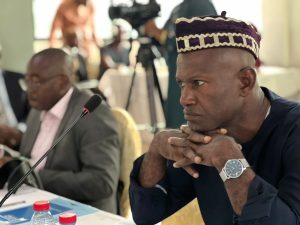
Focus of the thinking time activity was on safety and security of journalists. One aspect of safety and security identified by the participants is the need for proper training before engaging in the practice of journalism.
Speaking at the event, jointly organized by the Cameroon Association of English Speaking Journalists (CAMASEJ), and the Cameroon chapter of the International Union of Francophone Press (UPF), the minister of communication, Rene Emmanuel Sadi, praised the Journalist associations for working as one body and encouraged them to embrace the struggle to clean up the profession.
“The day to day regulation of the press should be done by the press,” Franklin Sone Bayen said.
Among the different requests made to the government are;
– Decriminalisation of press offences,
– Need to revalorize state subvention to the press,
– A shift from punitive laws to laws that promote and protect press freedom,
– Need for a Freedom of Information Act in the country.
The conditions under which most journalists practice in Cameroon today have forced them into self censorship.
“Impactful stories have been shelved because of the uncertainty which abounds after telling the story,” Viban told News Upfront.
Time to act
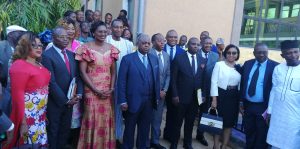
“It is somewhat ineffective to think of punishment for a preventable offence,” says Jude Viban.
The minister of communication who represented the government of Cameroon in the different activities to mark world press freedom day in Cameroon listened keenly to the requestd formulated and promised to continue to multiply efforts so that the government should step in powerfully with more pragmatic solutions.
Rene Emmanuel Sadi enjoined the media to always strive for excellence and professionalism in their respective activities.
“I encourage you all to be professional journalists with a sense of independence,” the Mincom boss told the press.
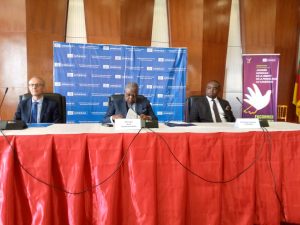
Without professionalism, the minister added, the press can misuse the liberty at their disposal.
“Liberty could do a lot of damage to individuals, to the country and even to journalists themselves,” Rene Sadi said.
